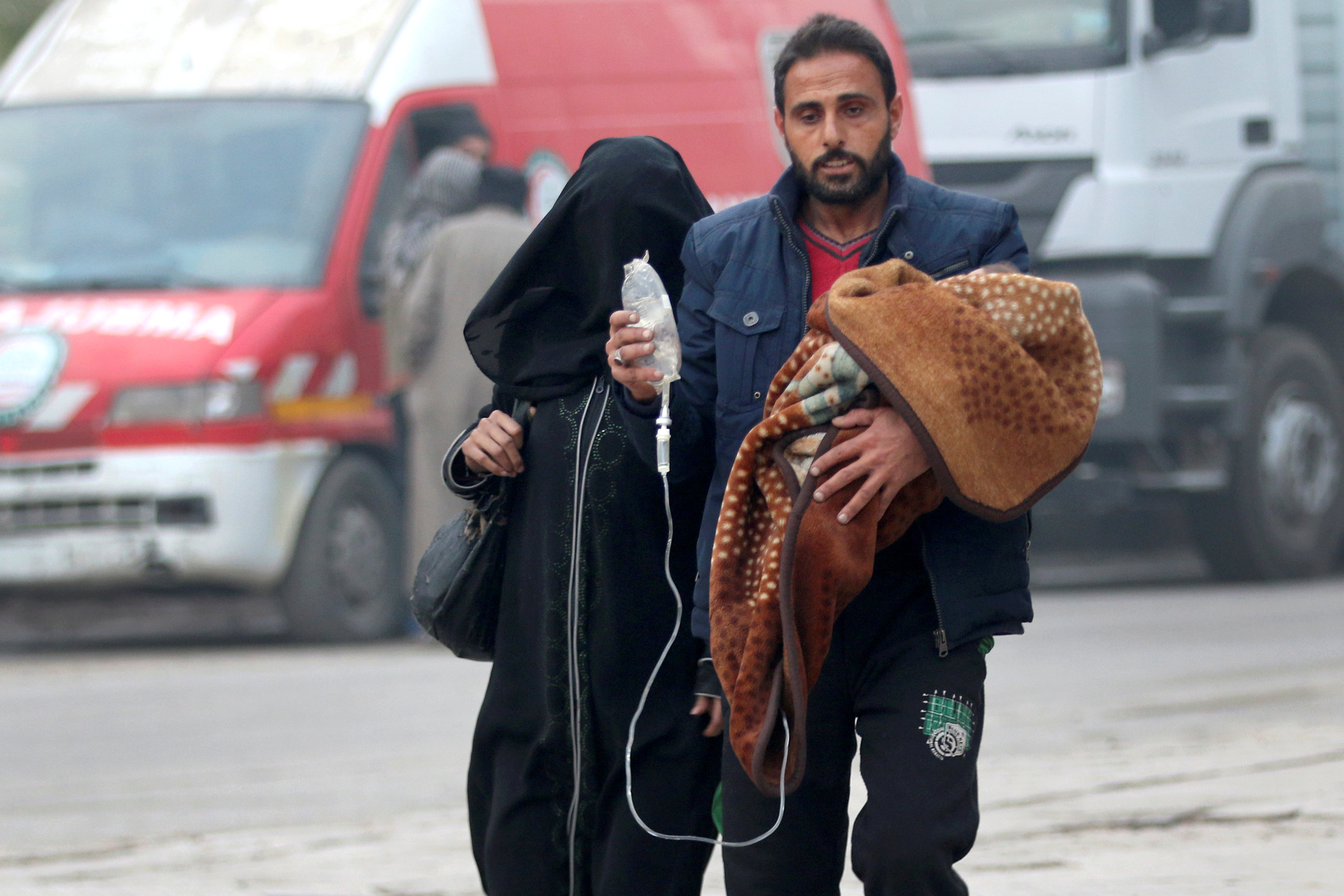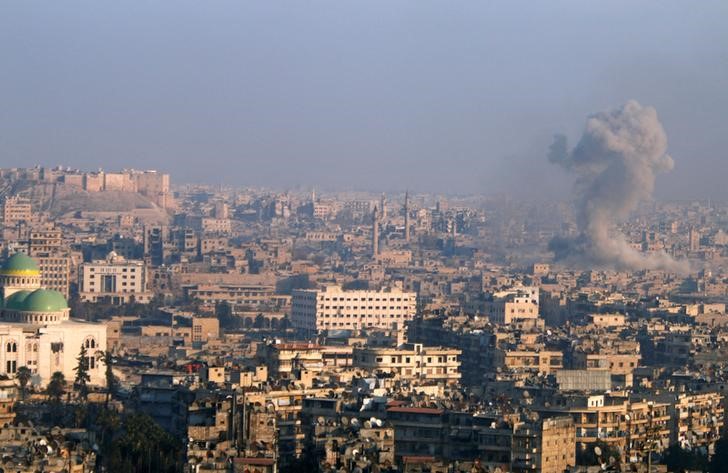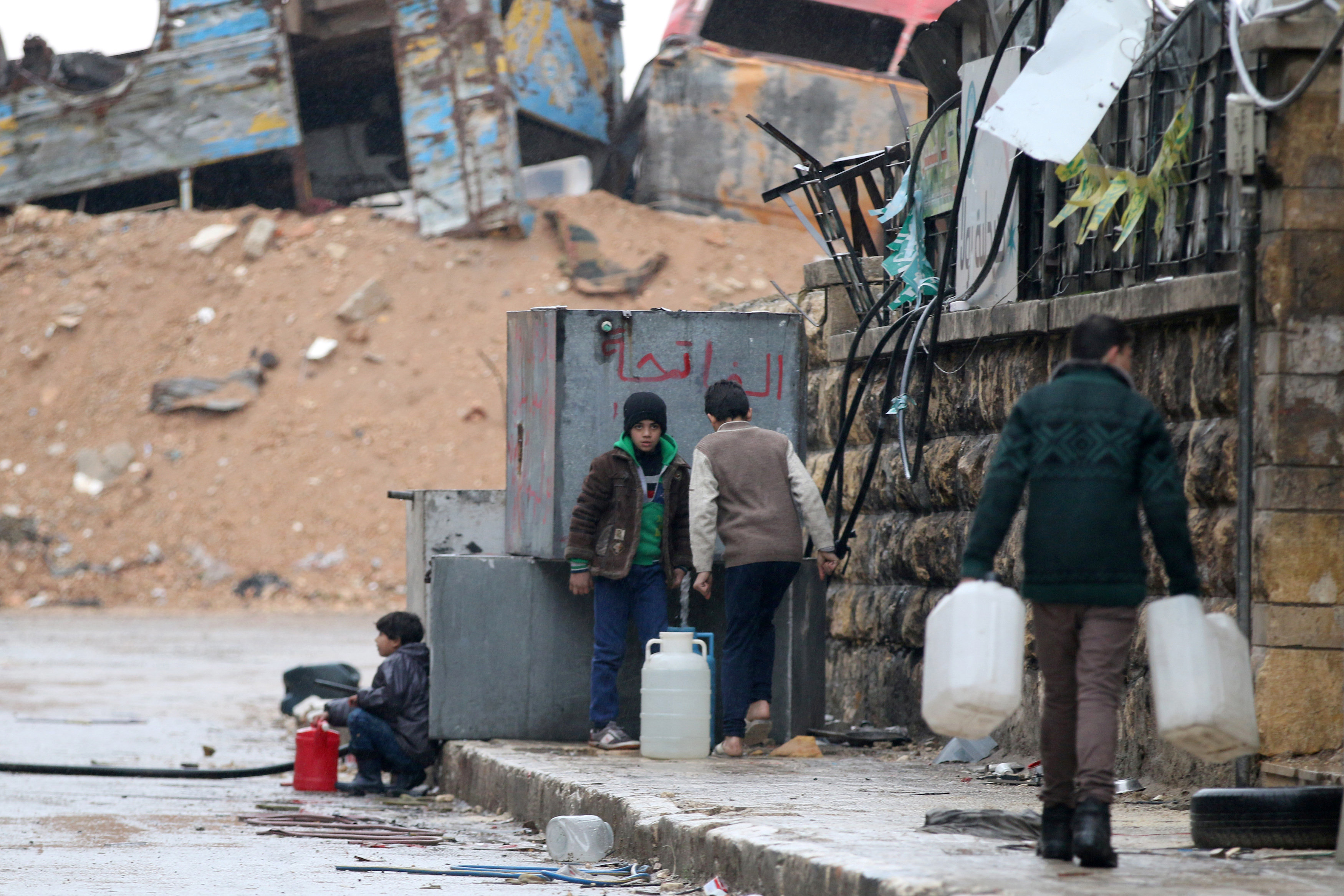
By Laila Bassam and Stephanie Nebehay
ALEPPO, Syria/GENEVA (Reuters) – The United Nations said on Tuesday it had reports that Syrian soldiers and allied Iraqi fighters had summarily shot dead 82 children, women and men in recaptured east Aleppo and a military source said the last rebel pocket could fall “at any moment”.
The Syrian army has denied carrying out killings or torture among those captured, and its main ally Russia said on Tuesday rebels had “kept over 100,000 people as human shields”.
The rout of rebels from their ever-shrinking territory in Aleppo has sparked a mass flight of civilians and insurgents in bitter weather, a crisis the United Nations said was a “complete meltdown of humanity”.
Hopes for a last-ditch deal to end the fighting by withdrawing fighters also seemed in doubt, with Moscow rejecting calls for an immediate ceasefire as concern grew over the fate of civilians.
“The reports we had are of people being shot in the street trying to flee and shot in their homes,” said Rupert Colville, spokesman for the U.N. office. “There could be many more.”
France said it had called for an immediate U.N. Security Council meeting over the alleged atrocities to focus on possible war crimes and crimes against humanity.
Behind those fleeing was a wasteland of flattened buildings, concrete rubble and bullet-pocked walls, where tens of thousands had lived until recent days under intense bombardment even after medical and rescue services had collapsed.
Colville said the rebel-held area was “a hellish corner” of less than a square kilometer, adding its capture was imminent.
The Syrian army and its allies could declare victory at any moment, a Syrian military source said, predicting the final fall of the rebel enclave on Tuesday or Wednesday, after insurgent defences collapsed on Monday.
“WANTON SLAUGHTER”
Turkish and Russian officials will meet on Wednesday to examine a possible ceasefire and opening a corridor, a senior Turkish official, who declined to be identified, told Reuters.
But Moscow, the Syrian government’s most powerful ally, rejected any immediate call for a ceasefire. “The Russian side wants to do that only when the corridors are established,” Russian Foreign Minister Sergei Lavrov said on Tuesday.

A man carries a child with an IV drip as he flees deeper into the remaining rebel-held areas of Aleppo, Syria December 12, 2016. REUTERS/Abdalrhman Ismail
The spokesman for the civil defence force in the former rebel area of Aleppo reckoned rebels controlled an area of less than three sq km. “The situation is very, very bad. The civil defence has stopped operating in the city,” he told Reuters.
A surrender or withdrawal of the rebels from Aleppo would mean the end of the rebellion in the city, Syria’s largest until the outbreak of war after mass protests in 2011, but it is unclear if such a deal can be struck by world powers.
By finally dousing the last embers of resistance burning in Aleppo, Syrian President Bashar al-Assad’s military coalition of the army, Russian air power and Iran-backed militias will have delivered him his biggest battlefield victory of the war.
However, while the rebels, including groups backed by the United States, Turkey and Gulf monarchies, as well as jihadist groups that the West does not support, will suffer a crushing defeat in Aleppo, the war will be far from over.
“The crushing of Aleppo, the immeasurably terrifying toll on its people, the bloodshed, the wanton slaughter of men, women and children, the destruction – and we are nowhere near the end of this cruel conflict,” U.N. High Commissioner for Human Rights Zeid Ra’ad al-Hussein said in a statement.
“FLEEING IN PANIC”
Aleppo’s loss will leave the rebels without a significant presence in any of Syria’s main cities, but they still hold much of the countryside west of Aleppo and the province of Idlib, also in northwest Syria.
Islamic State also has a big presence in Syria and has advanced in recent days, taking the desert city of Palmyra.
The army and its allies were advancing towards the Sukkari, Tel al-Zarazir and parts of Seif al-Dawla and al-Amariya districts, the Syrian military source said. “When the army regains control of these areas, its operation in the eastern areas of the city… will have finished”.
After days of intense bombardment of rebel-held areas, the rate of shelling and air strikes dropped considerably late on Monday and through the night as the weather deteriorated, a Reuters reporter in the city said.
However, rocket fire pounded rebel-held areas, the Syrian Observatory for Human Rights, a British-based war monitor, reported. Rebels and government forces still fought at points around the reduced enclave, the Observatory said.

Smoke rises as seen from a government-held area of Aleppo, Syria December 12, 2016. REUTERS/Omar Sanadiki
The U.N. children’s agency UNICEF cited an unnamed doctor in Aleppo as saying that many unaccompanied children were trapped in a building that was under attack, but the Syrian Observatory for Human Rights said it had no knowledge of the incident.
“Artillery shelling is continuing but because of the weather the aerial bombing has stopped. Many of the families and children have not left for areas under the control of the regime because their fathers are from the rebels,” said Abu Ibrahim, a resident of Aleppo in a text message.
Colville said he feared retribution. “In all, as of yesterday evening we have received reports of pro-government forces killing at least 82 civilians, including 11 women and 13 children,” Colville told a news briefing, naming the Iraqi armed group Harakat al-Nujaba as reportedly involved in the killings.
The military official said the rebels were fleeing “in a state of panic”, but a Turkish-based official with the Jabha Shamiya insurgent group in Aleppo said on Monday night that they had established a new frontline along the river.
“The bombardment is not on the frontlines, the greater burden of the bombardment is on the civilians, and this is what is causing a burden on us,” the official said.
Terrible conditions were described by city residents.
Abu Malek al-Shamali, a resident in the rebel area, said dead bodies lay in the streets. “There are many corpses in Fardous and Bustan al-Qasr with no one to bury them,” he said.
“Last night people slept in the streets and in buildings where every flat has several families crowded in,” he added.
Celebrations on the government side of the divided city lasted into Monday night, with fighters shooting rounds into the sky in triumph.
TIDE OF REFUGEES
A daily bulletin issued by the Russian Defence Ministry’s “reconciliation center” from the Hmeimin airbase used by its warplanes, reported that more than 8,000 civilians, more than half of them children, had left east Aleppo in 24 hours.
State television broadcast footage of a tide of hundreds of refugees walking along a ravaged street, wearing thick clothes against the rain and cold, many with hoods or hats pulled tight around their faces, and hauling sacks or bags of belongings.
One man pushed a bicycle loaded with bags, another family pulled a cart on which sat an elderly woman. Another man carried on his back a small girl wearing a pink hat.
At the same time, a correspondent from a pro-Damascus television station spoke to camera from a part of Aleppo held by the government, standing in a tidy street with flowing traffic.
In some recaptured areas, people were returning to their shattered homes. A woman in her sixties, who identified herself as Umm Ali, or “Ali’s mother”, said that she, her husband and her disabled daughter had no water.
They were looking after the orphaned children of another daughter killed in the bombing, she said, and were reduced to putting pots and pans in the street to collect rainwater.
In another building near al-Shaar district, which was taken by the army last week, a man was fixing the balcony of his house with his children. “No matter the circumstances, our home is better than displacement,” he said.
(Reporting By Laila Bassam in Aleppo, Orhan Coskun in Ankara, Lisa Barrington and Tom Perry in Beirut, Suleiman al-Khalidi in Amman and Tom Miles and Stephanie Nebehay in Geneva; Writing by Angus McDowall in Beirut; Editing by Pravin Char and Peter Millership)












